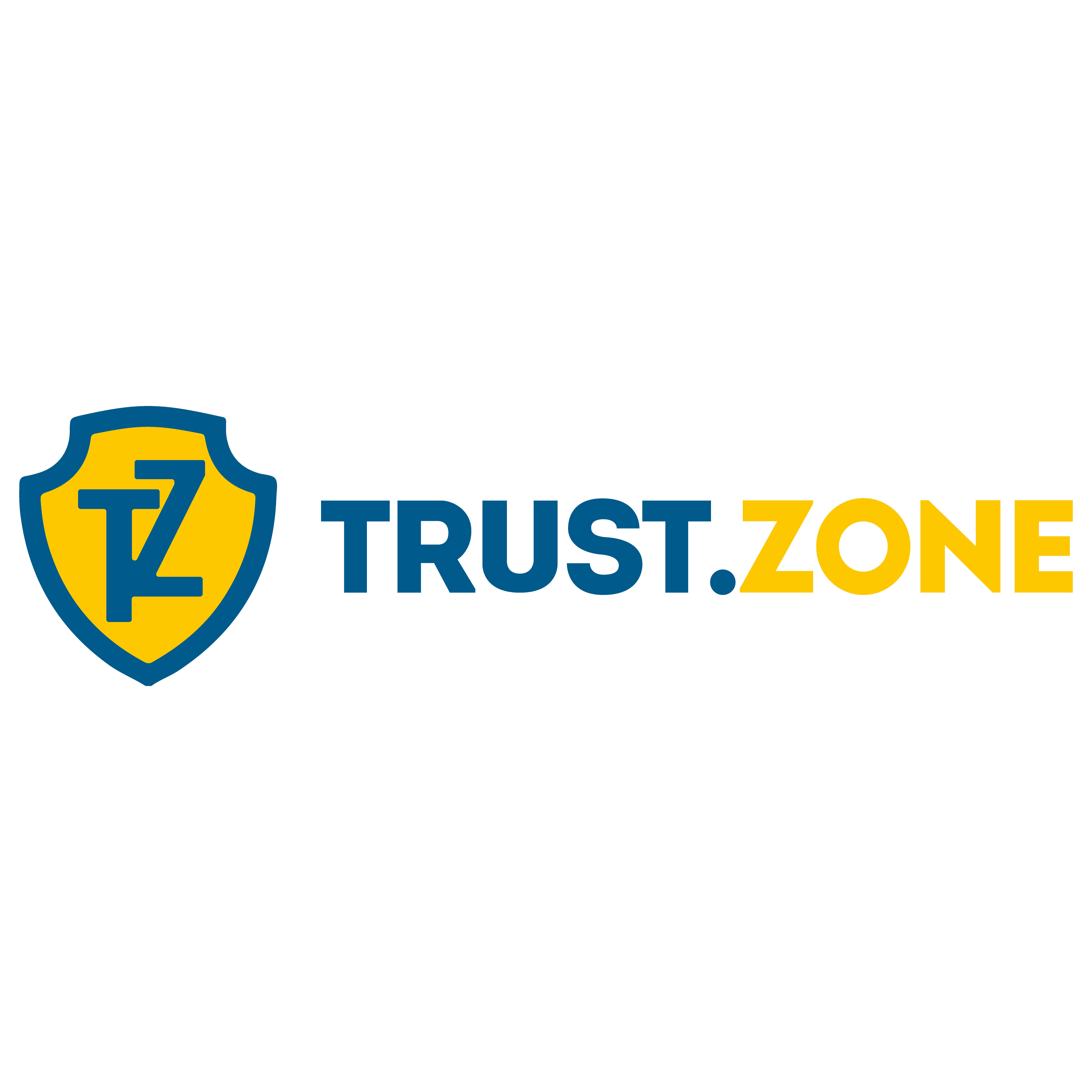Trust.Zone Review (2024): A Middle-of-the-Road VPN
Trust.Zone has been around for nearly a decade, and yet somehow, we’ve never encountered it before. It’s headquartered in the African Republic of Seychelles, which makes for some degree of protection against international data-sharing alliances. But how does this VPN stand up to big-name competitors in the industry in terms of speed and features?
In our Trust.Zone VPN review, we found that this VPN provider didn’t offer a great deal to write home about. It’s not the worst VPN service, but it’s far from being the best. It’s also best-suited to Windows users, with Mac installations being unnecessarily technical and long-winded. So, join us in exploring the speed, security, and features offered by Trust.Zone VPN.
Trust.Zone: A Short Review
Pros
- Uses OpenVPN by default, which is secure
- Includes a native kill switch
- Keeps zero logs
- Supports anonymous crypto payments
- Provides extensive setup guidance
Cons
- Mac installations are trickier
- Inconsistent DNS leaks on different servers
- Bare-bones app with minimal functionality
- Native app lacks alternate protocols
Trust.Zone is a lesser-known VPN provider that offers both a free subscription and a paid service. It’s not our first choice for a paid-for VPN service, and it’s not our our first choice of free VPNs either.
With the free tier, you’re limited by both data and time, with 3 days max to use the service. Meanwhile, the subscription option is relatively cheap, but it only comes with basic security features. You can get add-on features like DDoS protection and 3 additional simultaneous connections, but doing so will quickly jack up the price. It’s worth noting that other VPNs like Surfshark offer these features out of the box.
In terms of speed, Trust.Zone is pretty fast as long as you’re sticking to VPN servers in your immediate geographic vicinity. On far-away servers, you can easily be hampered by speed and ping if trying to play online games like Overwatch. And, in most cases, you can’t unblock any streaming platforms because Trust.Zone can’t circumvent their blocks.
However, for day-to-day browsing and streaming free movie sites, Trust.Zone might work for you. You can also snag an extra 10% discount if paying with cryptocurrency!
Our only question is: why choose Trust.Zone when other providers do everything this VPN can do — and better, too? Below, our Trust.Zone VPN review draws conclusions on why this VPN failed to impress.
| 💵 Price | From $1.99 a month |
| 📱 Operating systems | Windows, Mac, iOS, Android, Linux |
| 💻 Connections | 5 |
| 💳 Payment methods | PayPal, Credit card, Cryptocurrency, Bitcoin, PayPro Global |
| 🔒 Protocols | OpenVPN, IKEv2, WireGuard, L2TP/IPsec, SOCKS5 |
| 📥 Torrent options | Torrenting allowed |
| 📅 Money-back guarantee | Money-back guarantee, 10 Days |
| 📋 Logs | Zero logs |
| 🎬 Works with |
|
Speed – How Fast is Trust.Zone?

As part of our Trust.Zone review, we tested the service’s speed across different VPN servers. It’s a standard step in our in-depth look at every VPN, as speed tests give you an objective idea of how well-suited the service is for various tasks. For Trust.Zone, results are mixed, making for an uninspiring score of 5 out of 10 for speed:
- Download and upload speed is good on nearby servers, supporting streaming or gaming
- However, the further away you are from the server, the worse your speed becomes
- Speed is further impacted by an awful ping on far-away servers
- Day-to-day use isn’t a problem
Speed test results for Trust.Zone
We conduct our speed tests from the Netherlands, though the NL server wasn’t our best result. In general, we saw strong speeds on our local server, a UK server, and another in nearby Germany.
| Server | Download (Mbps) | Upload (Mbps) | Ping (MS) |
|---|---|---|---|
| No VPN | 94.65 | 94.72 | 4 |
| US (East) — New York | 26.15 | 18.48 | 183 |
| US (West) — Los Angeles | 12.31 | 10.95 | 300 |
| UK (London) | 76.52 | 62.89 | 36 |
| Japan | 9.09 | 6.79 | 470 |
| Australia | 6.41 | 4.72 | 616 |
| The Netherlands | 66.45 | 85.52 | 10 |
| Germany | 60.51 | 85.69 | 19 |
| Brazil | 7.05 | 7.89 | 435 |
| Canada | 19.24 | 20.72 | 179 |
| South Africa | 13.22 | 11.06 | 342 |
Overall, on nearby servers, we still achieved speeds at around 65 to 80% of normal. They were fast enough to allow for streaming, and they would also serve you well in torrenting or gaming.
Move toward the US, and things go downhill. Our connection dropped to almost a quarter of its usual speed, around 12 to 26 MBps. The good news is you can still technically stream at this speed (which is great, as Trust.Zone unblocks Netflix US!). Farther server locations produced slightly worse results, and in some cases, you can encounter problems when streaming during busy periods. You might be stuck staring at a buffer wheel.
However, it’s the ping that concerns us here. Your ping is essentially the time it takes for your device to send and receive a round-trip message. Your ping can be impacted by anything from server load to infrastructure quality and distance from the server. It’s crucial to have a low ping when gaming.
Why is this important? Around 20ms is considered excellent, while below 100 is roughly average. Start to hit 150ms and beyond, and you’re going to have a bad time. In other words, you won’t be able to play video games using this VPN on servers with high ping. It gets worse on the Japanese, Brazilian, and Australian VPN servers, too.
Speed during daily use
As noted above, day-to-day use isn’t a problem with Trust.Zone. If you simply want to browse the internet or check on your emails, you shouldn’t have any problems.
The bad news: high pings result in serious input lag when gaming. Fortunately, however, music and video streaming are unaffected. In other words: this is a fine VPN to use — as long as you don’t expect to play Call of Duty: Warzone.
Safety – How Secure is Trust.Zone?

Trust.Zone is a VPN provider that mostly checks all of the mandatory security boxes — but fails to take things a step further. That is, you won’t be inherently risking your privacy with this VPN. However, it also isn’t going to offer the most secure experience available with a premium VPN.
Still, it’s better than using no VPN at all. That’s why we’ve awarded Trust.Zone a 7 out of 10 for security:
- Only natively supports OpenVPN protocol
- Using other protocols is more effort than it’s worth
- Keeps zero logs
- Built-in kill switch and automatic startup settings
- Requires an email address for signup
Protocols
Trust.Zone’s website promises support for OpenVPN, L2TP/IPsec, IKEv2, SOCKS5, and the super-secure Wireguard. This left us confused, as the native app clearly only supports OpenVPN. Upon closer inspection, it appears that the alternative options are only available when you’re setting up an alternative custom configuration.
When testing Trust.Zone on a Mac, we installed an OpenVPN configuration using the OpenVPN software utility tool Tunnelblick. It didn’t work at all. We tried again using Wireguard, which did work, so we were able to use the VPN. However, the experience did leave us with questions around the suitability of Trust.Zone for Mac, especially for VPN beginners.
Regardless, OpenVPN is a strong and secure VPN protocol, so Windows users needn’t worry about using this protocol. And if you’re looking for a Mac-friendly alternative, try Intego Privacy Protection, a Mac-first VPN provider.
Protocols aside, Trust.Zone began using AES 256-bit encryption across all connections in 2015, so you can rest assured that the service is using secure encryption to protect your VPN traffic.
Logging and privacy
Trust.Zone promises that no logs are kept. According to the service’s privacy policy, no connection logs are retained, meaning authorities have no data to request as part of any investigations. The company collects your email address as your personal identifier for login purposes, though they also use it for “promotions.”
This point aside, there’s little else to mention — the privacy policy is incredibly short. We did a little internet sleuthing to see whether we could uncover any information to suggest otherwise, but the good news is we found nothing.
Kill switch
Trust.Zone does indeed offer a built-in, automatic kill switch that will sever your connection to the internet if your VPN connection drops out. A kill switch is essential because without one, your IP address — and your location — can be exposed if your VPN connection drops. So, this feature protects your privacy in case you do have connectivity issues.
You may want to learn more about kill switches, but essentially, it’s good that this feature has been included. It’s something you should look for in every VPN to protect your privacy.
Add-on features for additional cost
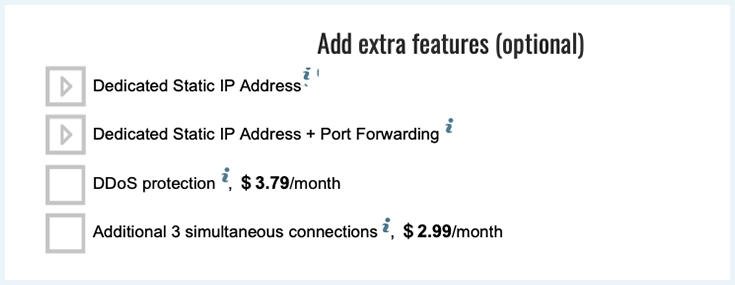
When you’re setting up your subscription, you can choose to add on a couple of extras. This includes dedicated IP addresses — more on that further down in the article — DDoS protection, port forwarding, and most notably, 3 additional simultaneous connections. Unfortunately, you’ll be paying an extra $2.99 per month on average for the benefit of using Trust.Zone on 4 devices simultaneously.
If I’d chosen this option when setting up my Trust.Zone account, I’d be paying approximately $4.98 per month. Surfshark, by comparison, supports unlimited simultaneous connections and is a superior VPN — and we can get Surfshark for around $2.30 per month right now. We’re pretty sure Starbucks costs us more than that on a typical day. So, that said, this Trust.Zone add-on doesn’t seem worth it to us.
Does Trust.Zone leak your data?
Since a VPN’s purpose is to cloak your IP address and improve your privacy, it shouldn’t leak your real location. That’s why we always put VPN providers through IP, WebRTC, and DNS leak tests.
At first, things looked bad for Trust.Zone. We installed an OpenVPN configuration on Mac by following instructions for OpenVPN software, Tunnelblick, on the Trust.Zone website.
When we tested to see whether Trust.Zone leaks your IP, the service failed. Our real IP address was still showing, plus the country from where we were browsing. On Mac, Trust.Zone also failed our WebRTC and DNS leak tests. At this point, we had to question whether the OpenVPN service was even working as intended.
We then installed Trust.Zone using Wireguard for Mac, and thankfully, our IP was changed, and Trust.Zone passed all leak tests. There were no IP address leaks in sight.
The Windows app suffers no IP or WebRTC leaks, either. However, the Windows service failed our DNS leak test to an extent. When we connected to an Australian VPN server, our actual location in the Netherlands was being leaked in addition to showing the VPN server location.
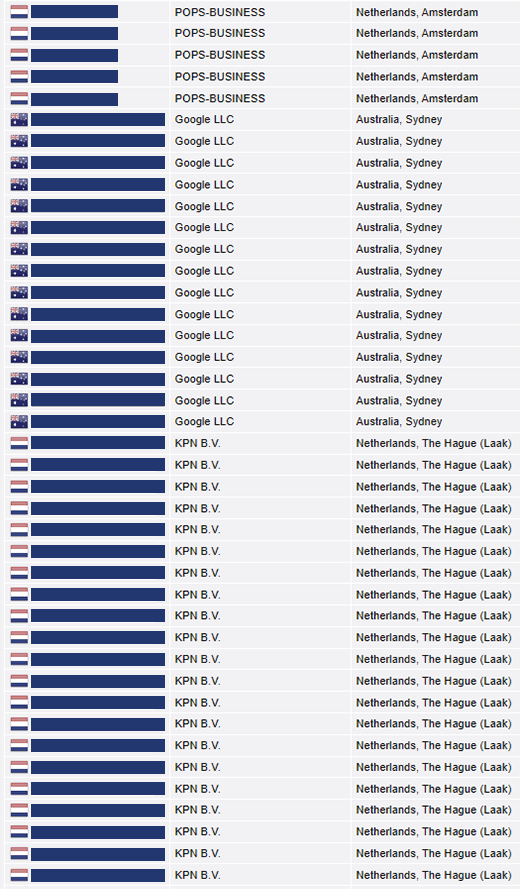
What information does Trust.Zone need?
When you sign up for an account, Trust.Zone requires your email address. That’s it as far as personal information goes. Should you choose to pay with cryptocurrency or perhaps PayPal, Trust.Zone will never have any other information about you. Given that the company stores no logs, this makes for a secure signup experience — you could even use a burner email.
Usability – How User-Friendly is Trust.Zone?

Installing Trust.Zone is simple — if you’re using a Windows PC or mobile device. Unfortunately, the process isn’t so straightforward on other computers. Other than that, this VPN provider offers a user-friendly and well-supported service, earning it 6 out of 10 points for usability in our Trust.Zone review.
- On the surface, a flashy and easy-to-use website
- Other parts of the website appear cheap and poorly designed
- Installation process is clear and straightforward for most users
- Mac installation is a little more difficult
- Customer service results vary, but are helpful
Trust.Zone’s website and installation process
Trust.Zone’s website impressed us at first glance. While this VPN provider is generally lesser-known than the big players, they’ve done a great job with their homepage. The Trust.Zone homepage strikes a good balance between professional and fun — on the surface, at least.
Venture off the beaten path, and things get a little messier. Pages such as the Blog are less well-presented and don’t appear to have been quality controlled quite so well. Still, all the information you need to get started is readily available and easy to find in the header menu.
Scrolling down the homepage, you’ve got an overview of how a VPN works, the various supported platforms, and some key information about the service. There are also social feeds and news updates that offer you some decent discounts on Trust.Zone.
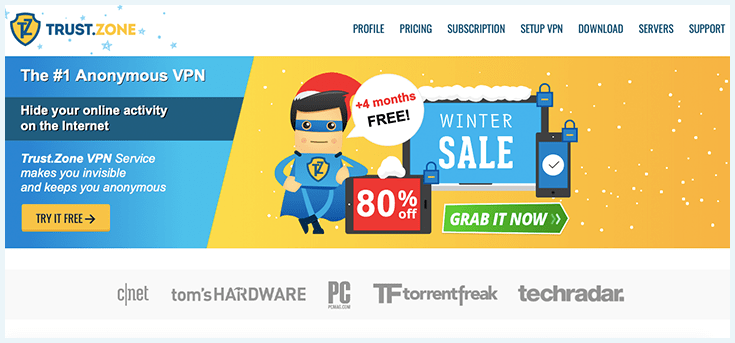
As a result, you should have no trouble working out how to install Trust.Zone if you’re a Windows user.
There is one caveat: Macs are not natively supported by Trust.Zone’s software. Since we use a Mac in many of our reviews, we’ll have to walk you through the slightly more complicated Mac installation.
First, though, here’s how to install Trust.Zone on a PC with the Windows client:
- Visit Trust.Zone’s official website.
- Be sure to click on the discount banner for the cheapest price.
- Choose your plan. You can try Trust.Zone for free, but only for 3 days and with a 1 GB data cap.
- Input your email, click Next, and then choose a secure password and fill in the captcha.
- Check your emails to activate your account, before heading to the Download page in the website’s topmost menu bar.
- Select the download that corresponds to your operating system, then download and install the software.
- Installation should be a breeze with the install wizard. Now, you’re ready to use Trust.Zone.
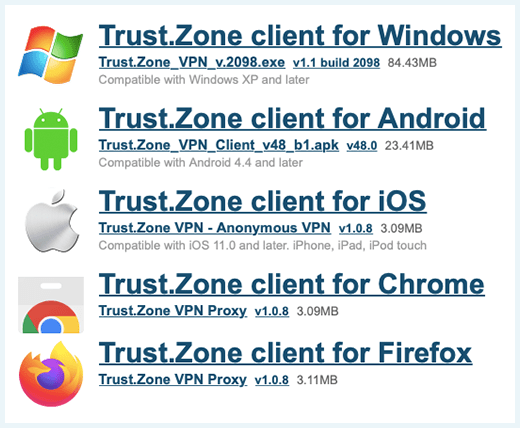
In addition to using Trust.Zone on a PC or Mac, you can also use this VPN when mobile. Both Android and iOS devices are supported. We were able to find Trust.Zone on the App Store, though it has been rated poorly by other users. The user interface also appears pretty stripped back.
Installing Trust.Zone on a Mac
So, onto the Mac installation. As mentioned, this process is a little more complicated. First, you’ll need to install another piece of third-party software — but don’t worry, it’s a trustworthy OpenVPN service.
- Download Wireguard for your Mac from the official Mac App Store.
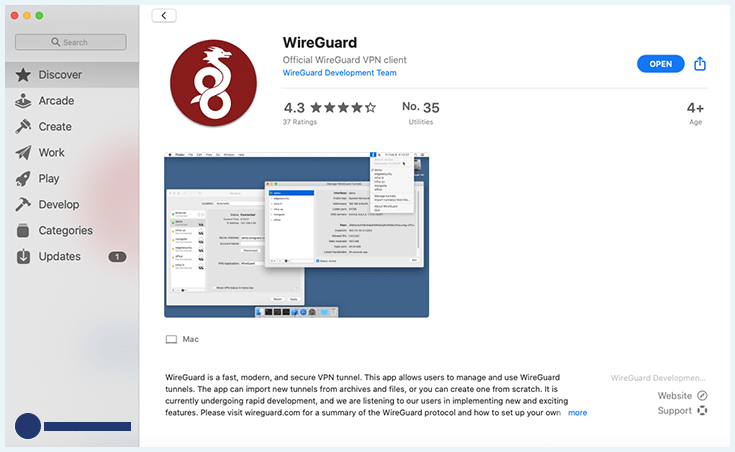
- Visit the Trust.Zone website while logged in, and download the wireguard.zip file in Step 2.
- Run Wireguard on your Mac.
- Click Import tunnel(s) from file.
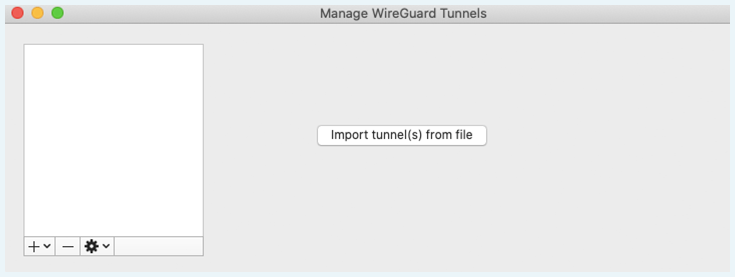
- Select the zip file from your Downloads folder.
- Click Allow when prompted.
- You’ll see your Wireguard app populate with a list down the left-hand side, which is a list of VPN servers.
- Simply choose a server and click Activate to establish a connection. You can infer which server you’re choosing by the country code in the server name.
We’ll admit that this is a clunky way of trying to use a VPN on your Mac. Finding the right server also relies on deciphering what the two-letter country codes are.
While Wireguard is trusted and highly secure software, it wouldn’t be our first choice purely based on this experience. Why give yourself a headache? There are far simpler options, which you can read about in our article on the best VPNs for Mac.
Trust.Zone’s appearance and ease-of-use
While the Trust.Zone website — or the homepage, at least — can stand up as a real competitior to larger VPN services, the application’s interface lets it down. Ironically, we were relieved to use Wireguard, as we found it cleaner than the Trust.Zone app! In fairness, Trust.Zone is a very simple app, so that at least makes it easy to navigate.
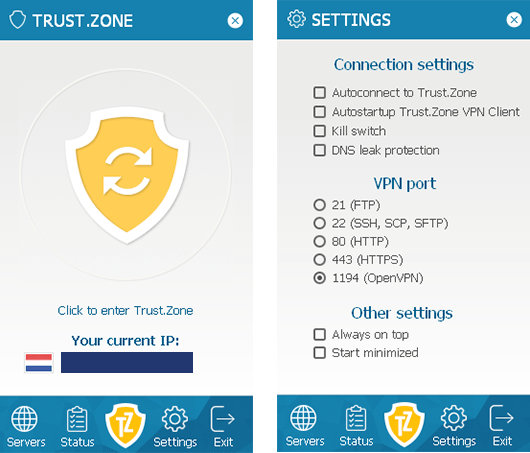
In terms of central functionality, you can choose a server by clicking on Servers. To connect, simply hit the yellow shield to establish your connection. The Status button shows whether you’re connected, but most apps don’t have a separate section for something so simple. It does feel like Trust.Zone is padding out an already limited interface.
While the Settings section is a little more detailed, it still lacks some of the key features seen in more popular VPN apps. At a high level, Trust.Zone will allow you to:
- Automatically establish a VPN connection when you start your computer
- Automatically start the VPN app simultaneously
- Enable a kill switch
- Enable DNS leak protection
The option to enable DNS leak protection is a little odd. In our opinion, any VPN should protect you against DNS and other types of leaks by default. And yet, on Windows, the service failed our DNS leak test.
Of course, if you’re using Trust.Zone on Mac, your experience will be wildly different, as you’ll only see the Wireguard interface. So, in summary, if looks are important to you, choose a bigger-name VPN like NordVPN or Surfshark.
Pricing and payment methods
Trust.Zone isn’t the cheapest VPN provider available (Surfshark, anyone?), but it’s not too expensive either. For the cheapest monthly price, you’ll need a 2-year subscription, which lands you at around $1.99 per month. The price rises significantly if you’re only signing up for a month.
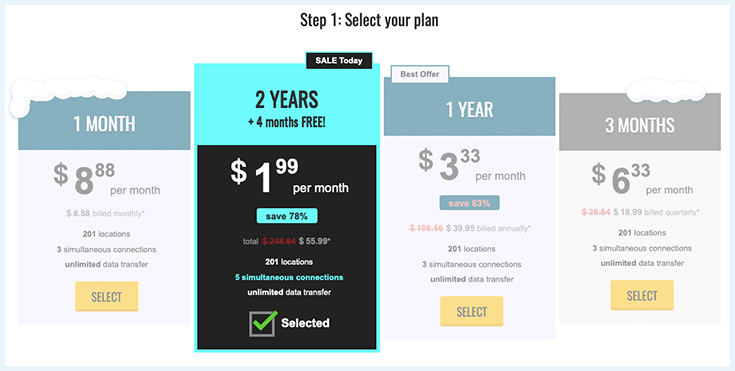
So, if you only need a VPN temporarily, consider choosing another service. Unlike big VPN players, Trust.Zone does not offer 30 to 45-day money-back guarantees. Use more than 1 GB of data or wait longer than 10 days, and you can’t get a refund.
There’s a free option, which is handy for trying the VPN without committing. However, it does only allow you 1 GB worth of free data. What’s more, there’s a hard 3-day limit on using the unpaid tier. Considering that the best free VPNs have higher data caps — typically 10 GB — and no time limit, this free VPN service falls short of expectations.
In spite of the not-so-cheap pricing and time limit on free use, Trust.Zone wins some points back for their supported payment methods. At the time of writing, you can check out using PayPal or cryptocurrency for enhanced anonymity. Crypto customers even snag an extra 10% off.
Customer service
As is often the case with smaller VPN providers, there’s a lot of self-help guidance to be found on the website. There’s a fairly extensive Setup VPN section in the menu bar, which guides you through installation on a range of other devices. These include smart TVs, routers, and even games consoles. We certainly found this useful for installing Trust.Zone on a Mac.
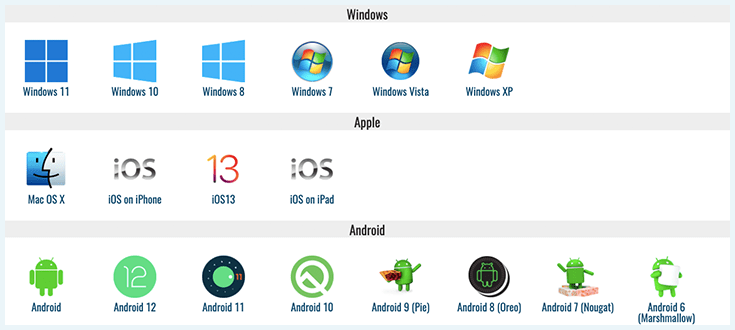
There’s also a Support button in the menu bar. This is how you can access a webform to send the team an email with any questions you have. By email, we had an inconsistent experience, with wait times for a response varying from 2 to 7 days.
If you’re a paying customer, you can access a support ticket system by logging in. The support ticket system appears quicker. We typically had a response within one business day.
Before asking your question, be sure to check out the FAQ page. We didn’t notice this section until prompted on the contact form. It’s hidden away in the footer of the website and might have the answers you need. Alternatively, check out our FAQ at the bottom of this article!
Server Network – Can Trust.Zone Unblock the Internet?

VPNs can often have teething issues with streaming services, so we weren’t too optimistic with our experience so far. Sure enough, Trust.Zone fails to unblock most streaming services.
And while the service covers nearly 100 countries, with just 180 servers, you’re potentially going to see server overload. As a result, we’ve given Trust.Zone 6 out of 10 for server network:
- 180 servers in almost 100 countries
- Appears able to unblock Netflix, though this may not last
- Doesn’t block torrenting, though speeds seem low
- Bolt on a dedicated IP address for around $1 to 10 on top of your subscription
Number of servers and locations
Trust.Zone’s server network is fairly unimpressive considering the competitors it’s up against. You get a choice of 180 servers in almost 100 countries. While the number of supported countries is good, the number of available servers is not. For example, NordVPN has 5,000+ servers, while CyberGhost has over 6,000.
Connecting numerous users to a single VPN server is like hitting the highway during rush hour. The more cars there are, the more congested it becomes, and the slower you travel. The same principle applies here, which is why it’s important to have a large number of servers at your disposal. Too many users on a single server can slow you down.
Here are the servers you can choose from when using Trust.Zone:
- Asia: Hong Kong, India, Israel, Japan, Singapore, Turkey
- Africa: South Africa
- Europe: Albania, Austria, Belgium, Bulgaria, Czech Republic, Denmark, Finland, France, Germany, Hungary, Ireland, Italy, the UK, Ukraine, Latvia, the Netherlands, Poland, Russia, Sweden, Spain, Switzerland, Romania, Norway, Estonia, Lithuania, France, Serbia
- South America: Brazil
- North America: Canada, United States (East and West)
- Oceania: Australia, New Zealand
Trust.Zone has some dedicated servers, though we’re not sure how effective they are. For example, there is a BBC Optimized server for streaming BBC iPlayer. However, we couldn’t get around the BBC iPlayer geo blocks while using Trust.Zone, even while connected to that specific server.
Trust.Zone and streaming (Netflix, Disney Plus, Hulu, BBC iPlayer)
Trust.Zone falls short as an effective VPN for bypassing geoblocking. As a result, you’ll struggle to access most streaming platforms. That said, with a Texas IP address, we found success unblocking Netflix!
| Platform | Can Trust.Zone unblock it? |
|---|---|
| Netflix | ✔ |
| Disney Plus | ✖ |
| Hulu | ✖ |
| BBC iPlayer | ✖ |
The Netflix outcome surprised us. As far as our industry research goes, other testers have failed to unblock Netflix using Trust.Zone. However, not only could we unblock the service, but we could stream titles directly once signed in. Note that Netflix could block Trust.Zone in the future in its war against VPN providers. Bigger providers fall victim to such blocks from time to time.
Other streaming services remained blocked, sadly. We hope to see Trust.Zone come up with ways to circumvent geoblocks for more streaming websites.
Our top recommendation for unblocking Netflix and other providers is Surfshark. In addition to dedicated streaming servers, Surfshark has No Borders mode, which is one of the best networks for overcoming restrictions.
Trust.Zone and torrents
Unfortunately, Trust.Zone doesn’t offer dedicated torrenting servers.
On the plus side, this VPN doesn’t block torrenting. In other words, you could torrent via Trust.Zone if you wanted to. We saw success in downloading legal content from the Pirate Bay, but speeds appeared limited. For the best chances of success, remember to choose a nearby server.
Dedicated IP address
Dedicated IP servers are available through Trust.Zone, though you don’t get them by default. When purchasing a subscription, you have to check an additional box.
By clicking on the arrow beside the Dedicated IP option, you can see a breakdown of pricing. At the time of writing, we saw different pricing, depending on the country you choose. This ranged from around $1.57 per month for a US IP address, to almost $9 per month for an Australian IP.
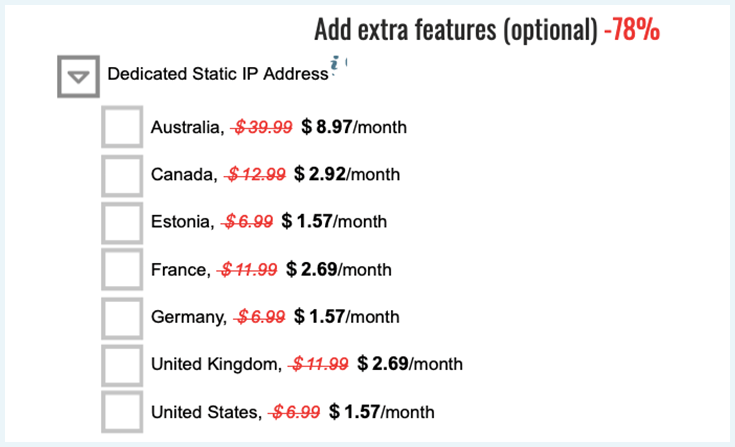
Our Experience With Trust.Zone
Have you ever had a meal at a restaurant that was just uninspiring? There was nothing wrong with it — but it lacked flavor, left you hungry, and you wished you’d chosen something more appealing? That’s the feeling we had when doing our Trust Zone VPN review.
Trust.Zone lacks anything beyond standard security features. It’s generally not fast enough for gaming, and you can’t unblock the vast majority of streaming platforms. The app isn’t particularly nice to look at, either.
On the plus side, we didn’t uncover any worrying security holes, poor data-gathering practices, or anything else of major concern. However, the whole experience is lackluster compared to using pretty much any premium VPN on the market — especially since you can get those VPNs at a cheaper price.
And since you’re here to find a competent VPN for your needs, let’s look at some better options:
- NordVPN offers a wealth of security features, in addition to offering around 25x more VPN servers.
- Surfshark is one of the cheapest VPNs for getting around geo-blocks, including Netflix and Disney+.
- CyberGhost has dedicated streaming servers for peak performance.
- ExpressVPN covers most of the globe with its server network, and it’s fast, too.
The bottom line is that while Trust.Zone doesn’t do anything inherently wrong, it also doesn’t do anything inherently well, either. You’re welcome to try it out for yourself and form your own conclusions, but just be sure you’re picking a VPN that’ll meet your needs.
If our Trust.Zone review has left you with questions, check out our most frequently asked questions below.
We weren’t too impressed with Trust.Zone. It isn’t a bad VPN service, but it underperforms in most areas compared to other VPN services. If you need a free VPN service, we recommend Privado VPN or Proton VPN. Alternatively, NordVPN is our top paid-for service. Of course, you can check out our Trust.Zone full review if you want to understand more about this provider!
Trust.Zone is a reasonably cheap VPN, with options starting from a few dollars per month. There are also extras you can get, like being able to use the subscription on more devices. It’s worth noting that some of those extras are included by default in cheaper VPNs like Surfshark. If you opt to add these extras, you could be paying more for Trust.Zone than much better VPNs. Trust.Zone has a free VPN service, but you can only use it for 3 days with a 1 GB data cap.
Surprisingly, we were able to unblock Netflix with Trust.Zone using a Texas IP address. We’ve seen other testers fail to unblock Netflix with Trust.Zone, so we weren’t expecting any success. Thankfully, we were able to stream content without any issues when using the US VPN server. Bear in mind that this could change at any time as Netflix combats VPN use. We recommend using Surfshark to access Netflix via VPN.
